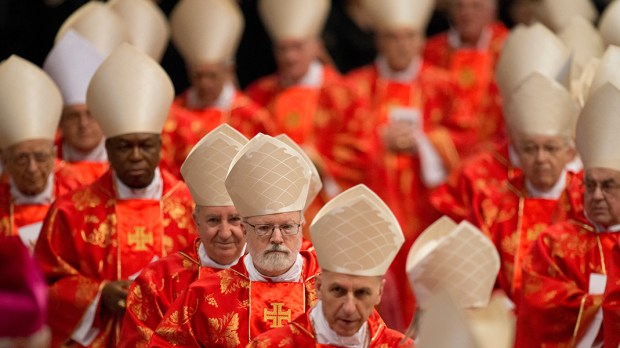The 22nd session of the Council of Cardinals (C9) opened on December 11 at the Vatican, in the presence of Pope Francis. With this three-day meeting, the C9 will close its fifth year of operation, with the prospect of concluding its work in 2018 with a reform of the apostolic constitution Pastor Bonus.
Proposed during the last conclave and formally announced on April 13, 2013, a month after Pope Francis was elected to the throne of Peter, the purpose of the Council of Cardinals is to advise the pope on the government of the universal Church. It also has been tasked with proposing a revision of the apostolic constitution Pastor Bonus (1988), which governs the functioning of the Curia.
A new constitution
“There will be a new constitution,” Cardinal Oswald Gracias, archbishop of Bombay, India, and a member of the C9, confirmed to I.MEDIA. Council secretary Bishop Marcello Semeraro said last September that the reform process was “three-quarters complete.”
The date of June 2018 was consequently mentioned as the expected date for concluding the council’s work, which means there will be two or three more meetings of the C9. It will then be up to the pope to make decisions concerning changes in the organization of the various dicasteries of the Curia.
However, do not expect “very major changes,” Cardinal Gracias said in another interview in Crux. Rather, he said, we should expect “a gradual change, a change of mentality, a change of approach” in the Curia. One of the main thrusts of this reform, Vatican spokesman Greg Burke emphasized in June 2017, is to make the Curia an instrument of evangelization at the service of the pope and the local churches.
Large projects undertaken
Vast projects are being proposed: decentralization, financial reforms, adjustments to the Vatican “justice department,” better training and management of the staff of the Holy See, and changes to the process of appointing bishops.
At the end of 2016, during his speech to the Curia, the pope made an initial assessment of the reforms being undertaken. The creation of a Secretariat for the Economy, proposed in 2014, whose direction had been entrusted to Cardinal George Pell, is still pending. In the same year, the Pontifical Commission for the Protection of Minors was set up. Then in 2015, the Secretariat for Communication was established, deemed “central” by the Secretary of C9, Bishop Semeraro. It should soon lead to the creation of a unique digital portal for Vatican media outlets—L’Osservatore Romano, Vatican Radio, CTV, and News.va.
Also among the innovations is the institution in 2016 of the Dicastery for Laity, Family and Life, the result of a merger of the Pontifical Council for the Laity and that for the Family. Also in 2016, the Dicastery for Promoting Integral Human Development was created. It brings together the areas of responsibility formerly covered by four Pontifical Councils: Health, Migrants, Cor Unum, and Justice and Peace.
Reform of the Secretariat of State
Finally, a reform of the Secretariat of State was initiated with the creation last November of a third section within this central body of the Curia. It is dedicated to the diplomatic staff of the Holy See—the nuncios in particular, on whom the present pontiff relies heavily for his government.
It remains to be seen what turn the reform of two other central Congregations will take: the Congregation for the Evangelization of Peoples, currently led by Cardinal Fernando Filoni, and that for Eastern Churches, led by Cardinal Leonardo Sandri.
Regarding the nuts and bolts of the meetings, Cardinal Gracias explained that the C9 work days begin with Mass at the Casa Santa Marta. The working sessions are then held from 9:00 a.m. to 12:30 p.m. and then from 4:30 p.m. to 7:00 p.m. The discussions there are very “free,” he continued, and the pope welcomes criticism.

